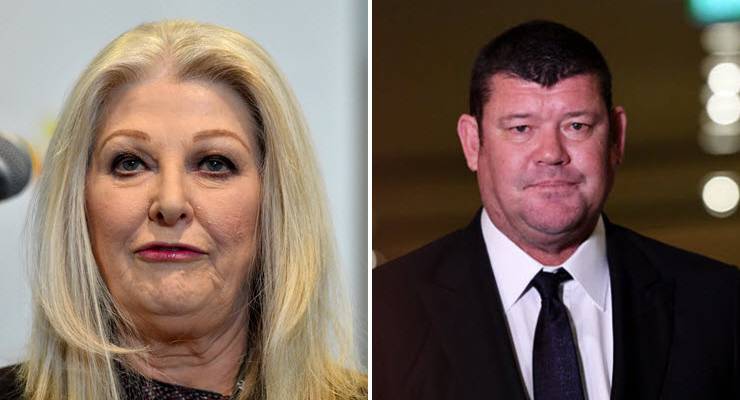
Has there ever been a public company as besieged as Crown Resorts?
This week alone we’ve seen Star Entertainment’s $12.7 billion merger proposal, an increased takeover bid from US private equity giant Blackstone, the commencement of the WA royal commission hearings into the company, the appointment of Steve McCann as CEO, and then yesterday’s comprehensive deal with NSW regulator the Independent Liquor and Gaming Authority (ILGA).
Come Monday, we’ve got the start of hearings at Victoria’s Crown royal commission.
Under James Packer’s control, Crown was traditionally an aggressive operator with politicians, regulators, rivals, media, minority shareholders and anyone else who got in its way.
Now, under temporary executive chair Helen Coonan it has become incredibly compliant with the ILGA. The change of tune coincided with the ILGA’s refusal to allow Crown to open its Sydney gaming operations when they were ready to launch last December.
ILGA chair Philip Crawford and Coonan are meeting fortnightly and the regulator continues to publicly praise Coonan, John Howard’s former communications minister, for being so agreeable and accessible.
Once Crawford banished much of Packer’s board and effectively stripped Packer of voting rights until October 2024, the power at Crown largely sat with Coonan and her three fellow directors: Jane Halton, Toni Korsanos and Nigel Morrison.
Yesterday’s concessions to the ILGA were substantial. Cashless gaming is coming, smoking in the high roller rooms will be banned by the end of 2022 and Crown has even agreed to pay $12.5 million to cover most of the ILGA’s costs from the Bergin inquiry, plus an annual $5 million casino supervision fee.
This fee applies from 2020-21, even though gaming operations in Sydney are unlikely to commence until early in the 2021-22 financial year.
All of these changes are eating away at future earnings, which might be why Crown’s biggest institutional shareholder, Perpetual, yesterday publicly called for Crown to open up its books and get cracking with the auction to sell itself.
However, given all the regulatory uncertainty and the ongoing impact of COVID-19, it is not unreasonable for Crown to move slowly. The company should be easier to sell once its Sydney casino is up and running and the two remaining royal commissions are out of the way.
Besides, at the end of the day it all comes down to James Packer and whether he wants to hand over control of the company — or is forced to by regulators.
Given that Star already has a 10% shareholder cap imposed by NSW regulators, if the Crown merger proceeds James Packer may be forced to partially sell down his 37% Crown stake to third parties, in addition to accepting the cash and shares offer from Star.
At the moment, Packer’s 249.5 million Crown shares are worth $3.2 billion thanks to the stock soaring from less than $10 before the first cash bid by Blackstone in March to $12.75 last night.
If Packer accepts the Star offer entirely in shares, he will own 24.4% of the combined business. If he opts to take the 25% cash component at $12.50, that would deliver him $780 million in cash and just under 20% of the combined business.
If forced to sell a further $1 billion-plus worth of stock to get his stake down to 10% of a combined Crown-Star, Packer would only have around $1.3 billion of his circa $5 billion fortune tied up in the company.
Crown revealed on Monday that all of its current directors would serve on any combined Crown-Star board. It also announced that former Lend Lease CEO Steve McCann will be the new Crown CEO. McCann would be a good option to run the combined business, although as Nine papers pointed out on Tuesday, he has some unpleasant history with Packer related to Barangaroo development disputes between Crown and Lend Lease.
When you also consider recent reports out of Israel about James Packer’s conduct there, questions remain about his suitability to continue as the largest shareholder of Crown.
Blackstone is currently offering $12.35 in cash, which might be tempting for Packer if looking for a complete exit. However, Blackstone runs casinos in Colombia and has already got itself offside with ILGA, so regulatory approval looks unlikely in the near term.
Blackstone also can’t match Star on synergies and cost savings, which Star values at around $2 billion.
The merger might also enable Star to avoid spending an estimated $1 billion on its proposed two new six-star hotel towers at its original property in Pyrmont because there would no longer be a need to compete with Crown Sydney’s better offering at Barangaroo.
The gambling sector is notoriously arrogant with regulators, and Star launched its Crown merger proposal without even giving the Australian Competition and Consumer Commission (ACCC) a heads up. ACCC chairman Rod Sims was clearly unimpressed, making the following comments to Guardian Australia on Tuesday:
We will do a detailed investigation. It will be a public review. We would look at the market for domestic table game customers. We would look at the competition between Barangaroo and Star in Sydney. We would also look at the extent to which there is intercity competition for customers.
Approval is still likely because a combined Crown-Star would have Australian gambling revenues of about $4.5 billion, smaller than market leader Tabcorp, which extracts about $5 billion a year from gamblers after its 2017 merger with lotteries giant Tatts.








I like the leapfrogging logic of the last paragraph. It closes off more nuanced analysis of large corporate takeovers and mergers. It has facilitated the consolidation of industry after industry in this country into duopolies or little better.
This in turn fosters (more) unenterprising complacency and corruption, including between government, “regulators” and industry.
Private equity companies are pretty evil, gambling conglomerates ditto. Between them they create a lot of carnage and misery with no offsetting good. Shut down all the casinos and dont give anything to private equuty companies.